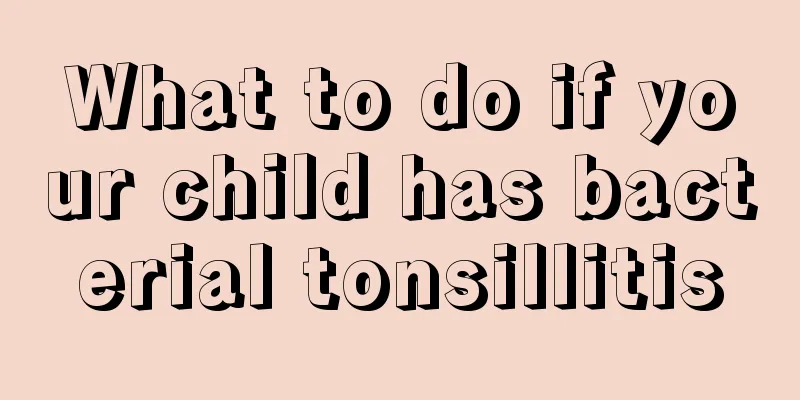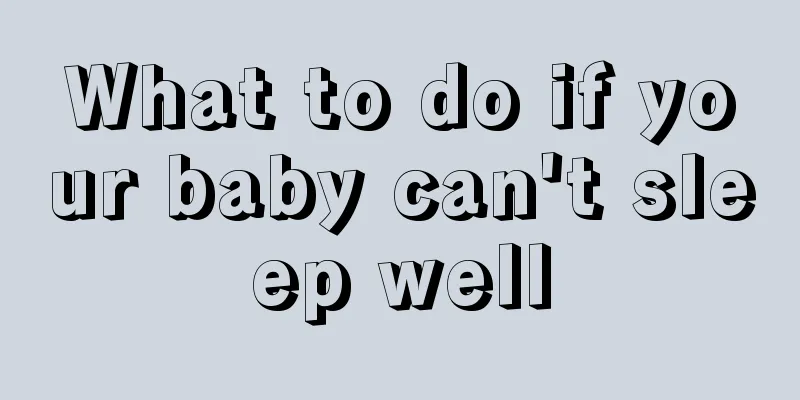What to do if your child has bacterial tonsillitis

|
Since children's bodies are not yet fully developed, they are easily affected by many diseases. Some children do not live in a particularly clean environment, so they are easily infected by various bacteria. For example, bacterial tonsillitis in children is an example. This disease can cause a child's throat to swell and hurt. So how should we deal with it? Let’s take a look at what the experts in this field say. 1. Cause The main pathogens are beta-hemolytic streptococci, Staphylococci, and Pneumococcus. Adenovirus can also cause this disease. Mixed bacterial and viral infections are also common. The bacteria may be invaded from the outside or hidden in the tonsil crypts. When the body's resistance is reduced due to cold, fatigue, physical weakness, excessive smoking and drinking, and stimulation from harmful gases, the bacterial reproduction is enhanced and can lead to purulent tonsillitis. Sometimes it is a prodromal symptom of acute infectious diseases, such as measles and scarlet fever. Acute tonsillitis often occurs as an acute attack on the basis of chronic tonsillitis. II. Treatment 1. Effective antibiotics are preferred This disease is mainly caused by bacterial infection, mostly streptococcal infection, and penicillin is the first choice for antibacterial and anti-inflammatory treatment. Those who are allergic to penicillin can choose erythromycin, lincomycin or ceftriaxone. 2. Symptomatic treatment When tonsillitis is complicated by high fever, headache and body aches, acetaminophen or ibuprofen can be used. 3. Topical medication You can choose to apply 3% hydrogen peroxide, 1% zinc oxide solution, 1% to 2% iodine glycerin, 10% tannic acid glycerin, etc. on the surface of tonsils once a day, and 10 times constitute a course of treatment. 4. General treatment Rest in bed, eat liquid food and drink plenty of water, improve nutrition and keep bowel movements smooth After reading the above introduction, do you know how to deal with this disease? If your child is unfortunately infected with this disease, you should pay attention to the hygiene of the environment in life. The air humidity in the room should not be too high, but it should not be too dry. Do not let your child stay in the air-conditioned room all the time. It is best to go outdoors for more walks. |
<<: What causes rheumatoid arthritis in children?
>>: Causes of indigestion in babies
Recommend
What are the hazards of excessive lead to children
Although lead is an essential metal element in th...
Child's chin is purple?
If a child's chin turns purple, it is mostly ...
5 dietary suggestions for fat babies
1. Cook your own meals as much as possible: Nowad...
Lumbar curvature in children
The lumbar spine is an important part. During the...
Ten major misunderstandings about children's nutritional supplements
Children's health is naturally inseparable fr...
What should I do if my baby has a stuffy nose and a cold?
Generally, for a newborn baby, each grain is very...
What to do if children have anorexia and picky eating
Some children with anorexia and picky eating ofte...
What are the causes of nausea and vomiting in children?
If a child suffers from nausea and vomiting, pare...
What to do if your child has internal heat and fever
For children, they often do not pay attention to ...
What should I do if my newborn baby has red eyes?
A newborn actually refers to a baby who has just ...
What is neonatal respiratory distress syndrome?
Many newborn babies will have signs of respirator...
Symptoms and signs of iron deficiency in newborns
For newborns, a good diet is very important. If t...
What are the symptoms of anemia in children?
I don’t know if you have ever suffered from anemi...
What happens if a newborn baby poops blood?
Many mothers are shocked when they find blood in ...
What is the problem with a three-year-old child who keeps coughing?
Why do 3-year-old children always cough? This pro...









